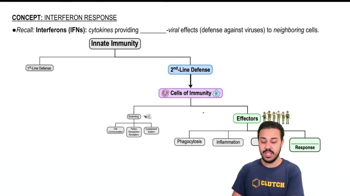Multiple Choice
Which immune cell is able to respond quickly after any subsequent encounter with the same antigen?
1506
views
 Verified step by step guidance
Verified step by step guidance Verified video answer for a similar problem:
Verified video answer for a similar problem:



 4:43m
4:43mMaster Classes of Antibodies with a bite sized video explanation from Bruce Bryan
Start learning